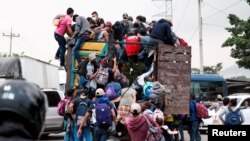Some 3,000 people left Honduras on foot Friday in the latest migrant caravan hoping to find a welcome, and a better life, in the United States under President-elect Joe Biden's new administration.
Seeking to escape poverty, unemployment, gang and drug violence and the aftermath of two devastating hurricanes, the migrants plan to walk thousands of kilometers through Central America.
But they will have to overcome a rash of travel restrictions in Guatemala and Mexico long before they even make it to the American border.
The quest is likely to end in heartbreak for many, with American authorities already having warned off the group that includes people of all ages and some entire families.
"I want to work for my house and a car, to work and live a dignified life with my family," said Melvin Fernandez, a taxi driver from the Caribbean port city of La Ceiba in Honduras, who set off on the long journey with his wife and three children, aged 10, 15 and 22.
Some of the migrants left shortly after 4:00 a.m. (1000 GMT) from the transport terminal of San Pero Sula, Honduras' second-largest city, headed for Agua Caliente on the Guatemalan border some 260 kilometers (162 miles) away.
They set off alongside roads with backpacks, some with the Honduras flag, many with small children in their arms, and most with facemasks to protect against the coronavirus.
They say they hope to catch lifts from passing motorists or truckers or, failing that, walk the entire way.
To enter Guatemala, the first country on their route, however, the migrants will have to show travel documents and a negative coronavirus test -- requirements that not all of them meet.
'Broken heart'
"We are leaving with a broken heart, because in my case, I leave my family, my husband and my three children behind," 36-year-old Jessenia Ramirez told AFP.
"We are going in search of a better future, a job so we can send a few cents" back home. We are trusting in God to open our path, Biden is supposed to give work opportunities to those who are there [on American soil]."
The travelers are hopeful that Biden, who takes over the U.S. presidency on January 20, will be more flexible than his predecessor Trump.
Biden has promised "a fair and humane immigration system" and pledged aid to tackle the root causes of poverty and violence that drive Central Americans to the United States.
But Mark Morgan, acting commissioner of the U.S. Customs and Border Protection, warned the group last week not to "waste your time and money."
The U.S. commitment to the "rule of law and public health" is not affected by the change in administration, he said in a statement, and migrant caravans will not be allowed to make their way north in violation of national sovereignty and immigration laws.
More than a dozen migrant caravans have set off from Honduras since October 2018.
But all have run up against thousands of U.S. border guards and soldiers under the administration of Donald Trump, who has characterized immigrants from Mexico as "rapists" who were "bringing drugs" and other criminal activity to the United States.
Hoping beyond hope
Guatemala, Mexico and Honduras have an agreement with the United States to stop north-bound migratory flows from the south of the continent.
Honduras has mobilized 7,000 police officers to supervise the latest caravan on its journey to the Guatemalan border. A first group of some 300 people already set out Thursday from San Pedro Sula.
Guatemala Thursday declared seven departments in a state of "alert," giving security forces the authority to "forcibly dissolve" any type of public groupings.
Mexican authorities said late Thursday that 500 immigration officers were being deployed to the Guatemalan border in anticipation of the caravan's arrival.
But the migrants are keeping the end goal in sight.
Among them, 28-year-old Eduardo Lanza said he dreamed of living in a country where people of different sexual orientations can live in dignity, "respect ... and a job opportunity."
Norma Pineda, 51, said last year's hurricanes left her "on the street."
"We are leaving because here is no work, no state support, we need food, clothes..." she told AFP.
New Migrant Caravan Leaves Honduras in Pursuit of American Dream




